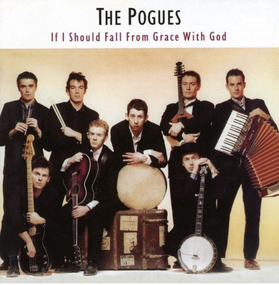|
I have been listening to Maeve Higgins’ memoir Maeve in America on audiobook. In this book she writes about her identity as an Irish woman, a funny person, and the cultural experience of being a funny Irish person in America. I have always appreciated her humor- I find her bracing, sharp, and smart; and as a person who adores puns, I love listening to her when she is just chatting away on podcasts because there is always another layer to her humor that leaves me meowing out in laughter as I drive, shower, cook, and so on. I live in New Mexico and she lives in New York City, but other than the fact that she is clearly a dog person and I am most definitely not a dog person, I wish I could meet her because I feel like we could be friends. Listening to her book this morning as I showered, I was thinking about my time in Ireland in the mid-1990’s. After college, I spent a year there, working through a student visa work-abroad program. Many people asked me, “Why Ireland?” I’d shrug. “Well, with a BA in music, I was destined to pour coffee somewhere. I figured it might as well be someplace good.” They asked, “Why not someplace else?” “Because they speak English in Ireland.”  That was part of it. In truth, ever since I had fallen in love with The Pogues in high school, I had wanted to go to Ireland. From The Pogues, I learned about The Troubles, and learned that there was another place in the English-speaking world where colonization had created a culture of dispossessed peoples. I was fascinated with Ireland for many reasons- I loved the music, I loved the counter culture, I found the idea of this colonized island where the people had fought back and were still fighting inspiring and invigorating. I didn’t have the maturity or resources to investigate these ideas then- I was pretty wrapped up in my own feelings of marginalization and I had no place to put that, and I was fairly depressed and aimless, and I really had no idea what I was going to do with my BA in music, so Ireland was a great adventure or curiosity. When I arrived in Ireland, I found out a few really important details that the American Myth of Ireland had failed to provide prior to my trip. First, a lot of Americans make a pilgrimage to Ireland to discover their Irish roots. A lot. Really, more than you can imagine. At the time, it was an island where more people emigrated than remained, and that was a key feature of the culture. Everyone I talked to had a cousin in Boston. Imagine all those people, for generations, coming back as tourist and talking about their grandparents’, great-grandparents’, great-great-grandparents’ immigration story. I get pretty tired of hearing about so-and-so’s Cherokee great-grandmother. I can’t imagine if all those people took regular trips to Tulsa to visit their Great-grandmother’s (relocated) homeland. When I was in Ireland, many of the people I met would become very guarded when they learned I was American. They would instantly pause, as though they were waiting for me to proudly announce my ancestral hometown. Some people came out and asked me. When I said, “no, I have no connection to Ireland. I’m Native American. Apache. I just came here because I thought it would be cool.” They would visibly relax- it was a mirror of the response I must have when someone starts up about their Cherokee Princess relation. People would show near disbelief at times, as though to ask, “Then why are you here? Why would you come here? We are all leaving, why would you want to be here?” .The second myth was one that I had created in my head- and that was that people drink coffee in Ireland. They may drink coffee now, but they sure didn’t drink a lot of coffee in 1995. It was all tea then, and nobody wanted to hire me to pour tea. There was just about one coffee shop in Dublin, and they did not want to hire me. It took me months to get a job. Dang, but I was broke. Broke, and depressed. That is how I would characterize most of my time in Dublin. Oh, and drunk. Broke, depressed, and drunk. So basically, I fit right in with everyone else in my building where nobody seemed to work much, but everyone had enough money for hash and cider. I had a friend of a friend with whom I stayed when I first arrived, Mary. Mary was a great resource- she was a little older than I, she had a house and she even gave me a temporary job when I wasn’t able to find one. Mary and I spoke a little about how we had a shared history of colonization- the Irish and the Native Americans. Mary talked about the burden of occupation, the history of Ireland and the difficulty of untangling the feelings of being part of the country that colonized yours, yet also deeply resenting that country. As I wrote earlier- I was still young and hadn’t really investigated my own feelings about my own colonization. I wish I still knew Mary so I could have this conversation again, it would be so much more nuanced. I wouldn’t be so drunk. In spite of the difficulties finding work, when I was in Ireland I felt at home. A quality of Irish culture that Higgins writes about in her book is the humor- that her family values laughter, taking the piss, slagging off. Although it was a surprise at first to me, and being a stranger in a strange land is always a little off-putting, I really loved the laughter I found in Ireland. I loved the relaxed feeling of laughing, the set-up and pitch of a really good joke, and the expectation that not only would I be able to take a joke, but it would able be okay for me to give it out every once in awhile. It was so much like Native humor, it was comfortable for me to slide right in and be myself. Humor in Indian Country is all about laughing at ourselves and each other. To fit in with my family, you are quick-witted, easily amused, and you understand that the worst insults are often the best compliments, because then you are part of the community. In Indian Country, people’s most disfiguring features become their nick-names. In the white world, you don’t mention a person’s size. In Indian Country, that guy’s name is Fatty. When I came back from Ireland, I went to nursing school then got a job as a hospice nurse. The first week on the job, we were all standing around a patient’s bed, changing her sheets and cleaning up her bed and general area. The patient was close to death, and it had been a prolonged decline. I was still training, so I was working closely with my supervisor, so she was talking me through the job, and we were having a great time that afternoon. We were laughing and chatting, and she stopped herself and said as an aside- “Oh, I’m sorry. I should have said, in hospice we tend to have gallows humor.” I was surprised by her comment, because I had no idea what gallows humor even was. I didn’t realize we were using gallows humor; we were simply doing our job, respectfully helping our patient get comfortable with clean bedding and nice surroundings, and involving her in our jokes even though she couldn’t respond any more because she was… well… dying. We weren’t making jokes at her expense, we were being respectful, but we were definitely laughing and having a good time. At that moment I realized that my life had been defined by a sense of humor that was maudlin and tinged with an edge of darkness. That is what we have in Indian Country, and that was what I found in Ireland- people who see the darkness, understand that there is death, poverty, and conflict. Instead of looking away or denying its presence, we choose to stand next to it and laugh.  As I read Higgins’ writing about her family’s humor, I wanted to invite her to spend time in Indian Country. I think she would find that she may struggle with the small talk- we would rather sit in absolute silence than talk slowly about tea during a train ride, but we will be happy to laugh long into the night, relaxing and chatting over nothing at all. I might be flexible about the dog thing, because Yorkies are adorable, and even forgivable given they are pedigree dogs and all that. Pugs though? They’re just weird.
0 Comments
|
AuthorI'm a Chiricahua Fort Sill Apache Nurse Researcher. I write, speak, and think about health equity and parenting in our complicated world. Archives
June 2023
Categories
All
Views expressed here are my own and do not express the views or opinions of my employer.
© 2023 all rights reserved, DrEmilyHaozous.com | The content in this blog is the exclusive property of the author unless otherwise indicated. You do not have permission to take content from this blog and use it on yours. You may use short excerpts and you may link to this blog, it is expected that any content has full and clear credit to the source content.
|
Proudly powered by Weebly
 RSS Feed
RSS Feed